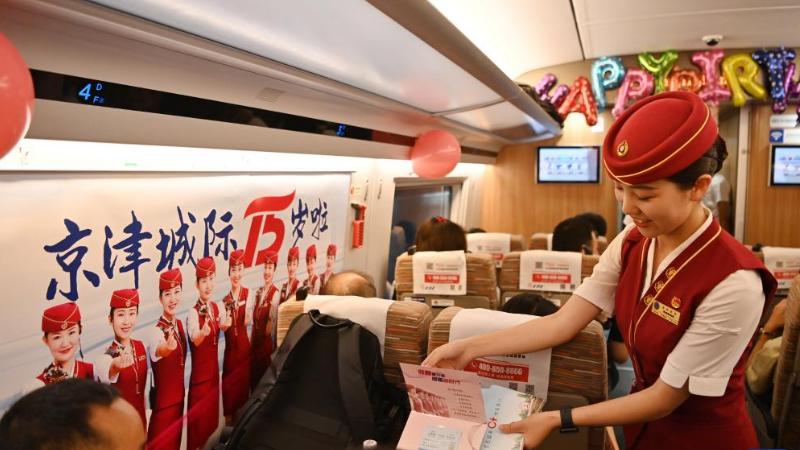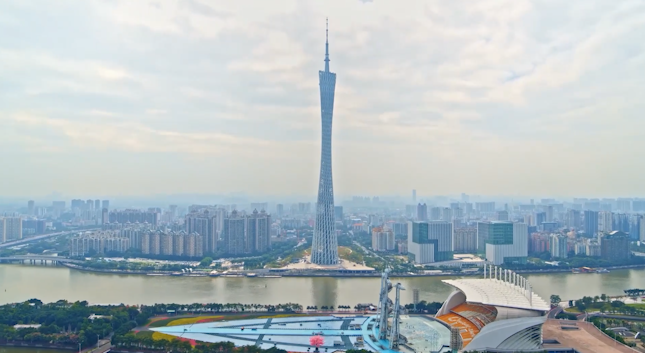* Standing at a new historical starting point, China's FTZ construction will usher in new opportunities and inject more vitality into the country's high-quality development.
* In the past 10 years, 278 institutional innovations have been formulated in FTZs and then replicated nationwide, covering investment facilitation, trade liberalization, financial opening-up, among other fields.
* China's pilot FTZs cover the eastern, central and western regions, and each one has its strategic positioning and development goals.
by Xinhua Writer Jiang Tingting
BEIJING, Aug. 2 (Xinhua) -- Since the establishment of the first pilot Free Trade Zone (FTZ) in Shanghai in 2013, China has so far boasted 21 FTZs and the Hainan Free Trade Port.
From the coastal areas to the central inland regions and border provinces, the FTZs have become pacesetters for the country's high-standard reform and opening-up.
Standing at a new historical starting point, China's FTZ construction will usher in new opportunities and inject more vitality into the country's high-quality development.
HOT-SPOT FOR FOREIGN INVESTMENT
In October 2022, Albemarle Lithium UK Ltd., a subsidiary of Albemarle Corporation, a leader in the global specialty chemicals industry, completed the acquisition of a local new energy material manufacturer in Guangxi Zhuang Autonomous Region for approximately 200 million U.S. dollars.
The new company -- Guangxi Albemarle Lithium Co., Ltd. -- produced 2,022 tonnes of lithium hydroxide in the remaining two months of last year, realizing an industrial output of 1 billion yuan (about 140 million U.S. dollars).
Located near the Port of Qinzhou in the Guangxi FTZ, the new company can ship its products to Vietnam, Thailand and other ASEAN countries without changing containers at the port, which greatly assists the company in expanding into overseas markets, said Zou Ling, a production director with the company.
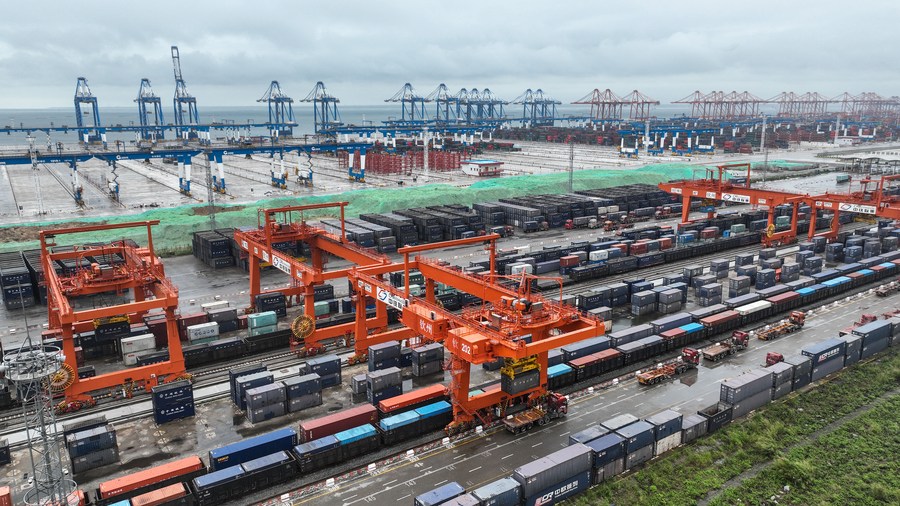
This aerial photo taken on May 11, 2023 shows an automatic container terminal of Qinzhou Port and a railway container distribution center in Qinzhou City, south China's Guangxi Zhuang Autonomous Region. (Xinhua/Zhang Ailin)
In addition, the Guangxi FTZ provides strong support to firms in terms of taxation, investment and human resources. "The FTZ helped our employees find accommodation within a day, so they can concentrate on their work," Zou said.
Over the past decade, China's FTZs have played a crucial role in attracting foreign investment and stabilizing foreign trade.
In 2022, the 21 FTZs saw exports and imports rise 14.5 percent year on year to 7.5 trillion yuan, accounting for 17.8 percent of the country's total. The utilized foreign investment in FTZs exceeded 220 billion yuan, making up 18.1 percent of the total.
The 21 FTZs continued to see a steady increase in foreign investment in the first half of 2023. "Covering less than four thousandths of the country's land area, the FTZs have attracted 18.4 percent of foreign investment in China in the first half," said Yang Tao, an official with the Ministry of Commerce.
SPEARHEAD OF INSTITUTIONAL INNOVATION
The booming development of FTZs cannot be separated from the support of institutional innovation.
In the past 10 years, 278 institutional innovations have been formulated in FTZs and then replicated nationwide, covering investment facilitation, trade liberalization, financial opening-up, among other fields.
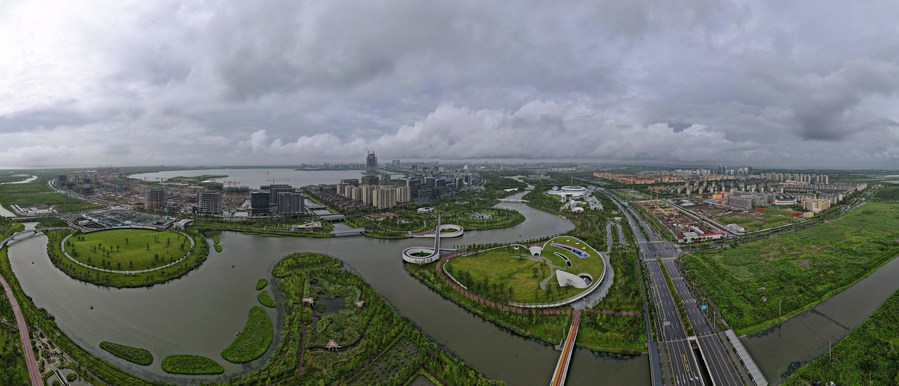
This aerial panoramic photo taken on Aug. 1, 2023 shows the Dishui Lake at the Lingang new area of the China (Shanghai) Pilot Free Trade Zone in east China's Shanghai. (Xinhua/Fang Zhe)
The negative list for foreign investment is a case in point. The "negative list" approach was first adopted in the Shanghai FTZ in 2013, and was soon extended to all FTZs and the whole country.
Nowadays, foreign enterprises have become accustomed to checking the "negative list" first when they come to China.
The number of items on the FTZ negative list has been reduced to 27, and all manufacturing sectors have been opened to foreign investment, according to the newest version of negative list.
"The FTZs have served as testing grounds for new trade and governmental policies such as streamlined customs clearance and liberalization of specific sectors before they are implemented on a national level. They will continue to play such roles in the future," said Chen Bo, professor of Huazhong University of Science and Technology.
DIFFERENT POSITIONING, DEVELOPMENT GOALS
China's pilot FTZs cover the eastern, central and western regions, and each one has its strategic positioning and development goals.
For instance, the Guangdong FTZ supports economic integration and transit with Hong Kong and Macao, while the Fujian FTZ focuses on promoting trade with Taiwan.
Yunnan has long shared borders with Myanmar, Laos and Vietnam, making it a natural trading and access point between China and the ASEAN nations.
"The Yunnan FTZ will utilize its proximity to ASEAN countries to explore new cross-border cooperation models," said Lin Zhigang, an official with the Kunming zone of the Yunnan FTZ.
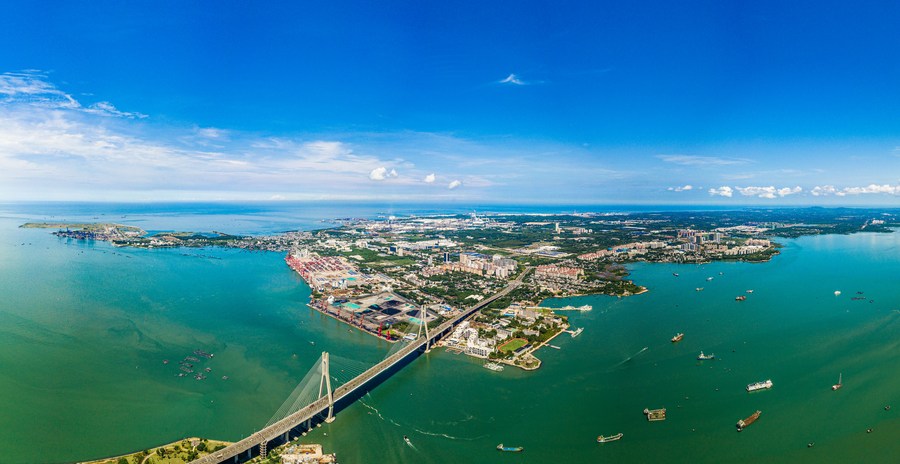
This aerial panoramic photo taken on Oct. 2, 2022 shows the Yangpu Economic Development Zone in south China's Hainan Province. (Xinhua/Pu Xiaoxu)
Owing to their rich experience in foreign trade, the Hainan Free Trade Port and the FTZs in Beijing, Shanghai, Tianjin, Guangdong and Fujian have been chosen to conduct trials to align with high-standard international economic and trade rules, including the Comprehensive and Progressive Agreement for Trans-Pacific Partnership and the Digital Economy Partnership Agreement.
China will continue to support FTZs to explore differentiated development in accordance with their unique positioning and characteristics, and sum up and promote their innovation practices in a timely manner, said Shu Jueting, spokesperson for the Ministry of Commerce. ■
(Video reporter: Sun Qing; Video editors: Jia Xiaotong, Wei Yin, Hong Yan, Zheng Xin and Wang Han. Huang Chenning, Meng Xiang, Qiao Xinyan, Zhong Yaqing also contributed to the story.)


